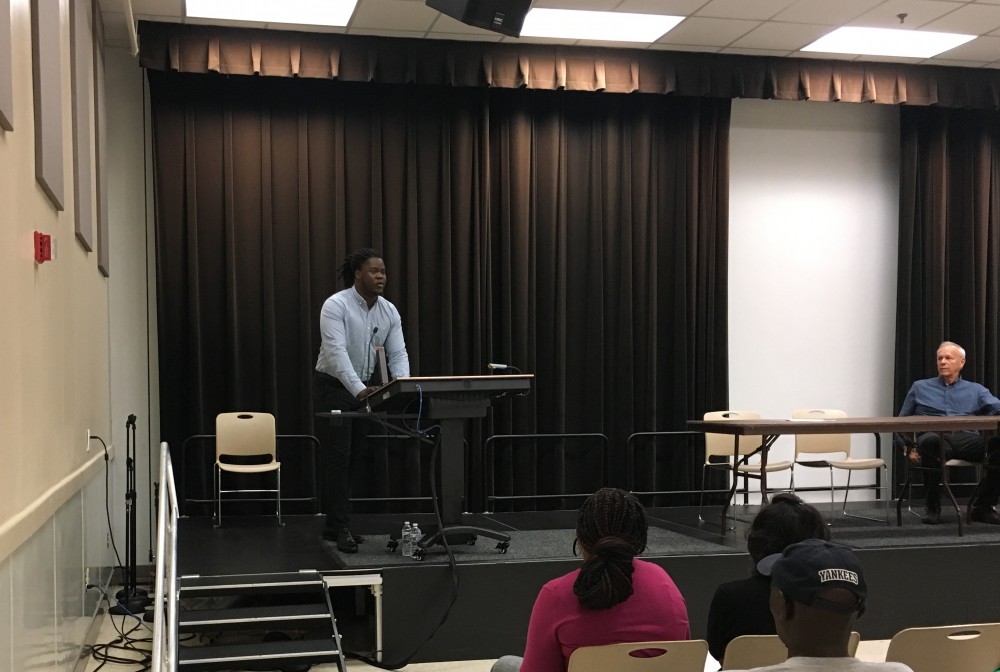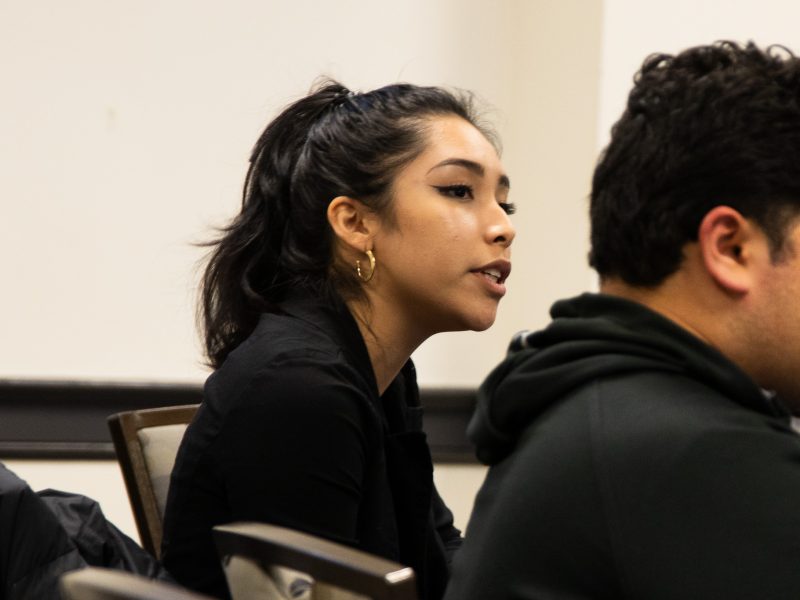Last year, when Michael Oduyebo was earning $9.30 an hour at his job in the University of Maryland’s Office of Multi-Ethnic Student Education, he sometimes felt like he might as well be working for free.
“Every time I got paid a dime, it just disappeared the next day or the week after,” said Oduyebo, a junior computer science major.
Oduyebo’s paycheck got a bump when the state minimum wage jumped to $10.10 an hour in July, but he said he still struggles to gather up enough funds to buy groceries, make rent for his apartment in the Enclave and pay part of his tuition, even with a second job at a consulting company off campus.
Oduyebo shared his experience with legislators Friday at a town hall meeting organized by the union that represents employees at this university — the American Federation of State, County and Municipal Employees 1072. While Oduyebo isn’t a member of AFSCME, the group’s leaders invited him to address state representatives at the Nyumburu Cultural Center alongside other university workers.
The town hall meeting came about two weeks before union representatives and other state employees go to the bargaining table with Gov. Larry Hogan to hash out a wage increase for the upcoming year. These talks, which happen each year from September to December, are where they determine how much money the state will give the university to give raises to its employees, AFSCME staff director Sam Luebke said.
[Read more: Grad student employees in Maryland won’t get collective bargaining rights this year]
The university has significant leeway in how it decides to divide this money among employees. Last year, university President Wallace Loh received a $75,000 wage increase, while about half of exempt workers at the university — who earn yearly salaries instead of hourly wages and don’t receive overtime pay — haven’t seen a wage bump for three years, according to union leaders.
But in their new contract that was ratified in June, the union won an agreement to negotiate with the administration about how raises are handed out.
“We are going to go to the state and demand as big a pot of money as possible, but we also need to make sure the university is dividing up that money in the fairest way,” said Luebke, who was the lead negotiator for the union’s new contract.
The three state legislators who came to the town hall — Sen. James Rosapepe (D-21), Del. Joseline Peña-Melnyk (D-21) and Sen. Paul Pinsky (D-22) — listened to worker testimonies and promised to advocate for them at the state house and in front of Loh.
Pinsky vowed his support for a tax hike to draw in more revenue for the state. He said this would free up more money to be spent on the salaries of state employees, but did not provide specifics on which taxes he thought should be increased.
“There are a lot of very wealthy people in the state who aren’t paying their fair share,” Pinsky said. “To increase the salaries for you folks, we have to raise more money.”
[Read more: Ben Jealous wants to lower Maryland’s sales tax]
The senator’s comments drew murmurs of agreement from the crowd of about 50 university employees, many of whom sported gray staff shirts. Throughout the town hall, workers drifted in and out of the center’s multipurpose room — many used their lunch breaks to attend, and had to clock back in to work before the meeting ended, said union member Jerrell Keys.
Keys came to the meeting on his day off to address legislators. The $23,000 salary he earns as a housekeeper at the Stamp Student Union is not enough to support his four children, so he also works in housekeeping at Prince George’s Community College. He typically has two hours in between shifts to spend with his family.
“I just want an opportunity to stay above water and work a regular job,” Keys said. “Go to work, come home, help my kids with their homework and not be deprived of sleep.”
Peña-Melnyk urged workers at the town hall to be politically active, contact their state representatives and vote in the upcoming election.
Oduyebo said he believes in the power of the community to raise wages for university workers. After hearing from state representatives, he was assured that work is being done in the state house to advocate for employees like himself.
“I hope that work doesn’t stop,” he said. “I hope that there are more senators and more delegates behind them working on this issue, and at the end of the day, I hope for change.”



